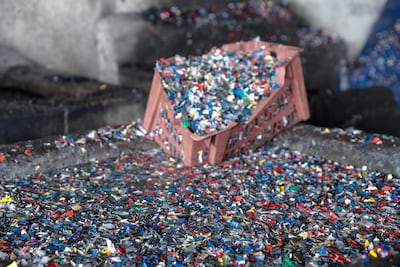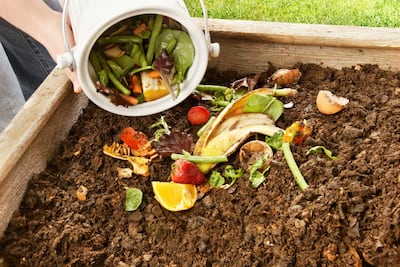The average UAE resident generates about 2.7 kilograms of waste every day, according to 2016 figures from Dubai Carbon.
That's more than double than someone in Europe – who produces just 1.2kg – so you can see that recycling rates need to improve.
The authorities have been trying to boost recycling and aim to recycle or reuse 75 per cent of municipal solid waste by the end of this year. Currently, 77 per cent of such waste is dumped in landfills.
This week, Environment Agency Abu Dhabi set out a pledge to ban single-use plastic bags by the end of 2022.
Recycling varies from emirate to emirate.
It might not be as easy to recycle in the UAE as elsewhere in the world, with only Sharjah offering curb-side collections from homes in certain areas, but this guide contains everything you need to know about reducing your waste footprint.
A version of this story was first published in April, 2021
How to recycle in Dubai

Although rubbish is collected every day from your door by the Municipality, only a few Dubai communities offer the same service for your recycling.
An easy, if time-consuming, alternative is for residents to find their nearest recycling station. Dubai Municipality set up 13 in strategic locations around the emirate, including one in Hatta.
The centres have smart bins for 18 different types of materials, including paper, cardboard, plastic, metal packages, glass, used clothes and fabric waste, rubber, leather, wood, electronic waste and batteries.
Sensors monitor the capacity level of each bin to schedule unloading shifts, so in principle you should always be able to drop off your rubbish.
Ms Kshemkalyani believes these centres are the best way to recycle in the UAE.
"Putting the rubbish in the recycling bins reduces the burden on the system. If you clean and segregate the materials, you are making it easier for the waste management companies to recycle it properly."
But washing bottles and cans is vital. One dirty item can contaminate an entire rubbish bin, and then all the contents are sent straight to the landfill, so it is important to clean and air dry all materials.
Short on time? Green Truck is a private service run by Enviroserve that picks up recyclables, segregates the materials and then sends them off to local recycling factories.
A subscription costs Dh120 a month and the service is available to residential communities and corporate offices in Dubai.
How to recycle in Abu Dhabi

Last year, residents, companies and government departments in Abu Dhabi produced more than 11 million tonnes of rubbish. Just 36 per cent was sustainably treated or recycled.
Recycling services in the capital are provided by Tadweer, Abu Dhabi’s Waste Management Centre. There are 15 recycling stations in Abu Dhabi. Residents should look for the colourful bins in places like Khalidiya Public Park.
Clear and coloured glass, paper, cans, bottles, wood, cardboard, mobile phones, used batteries, plastic, wool, metal and cotton can all be sorted and segregated.
Too busy to find your nearest recycling point? A new service called Recapp provides free door-to-door collection of recyclables in Abu Dhabi.
The app enables users to earn points in exchange for recycling plastic and metal packaging. At present, they do not collect paper, cardboard or glass.
Since launching in November, they have collected 115 tonnes of plastic bottles and metal cans. The points earned by recycling enthusiasts can be exchanged for gifts with their partners.
The service is due to expand to Dubai at some stage.
How to recycle in Sharjah
Waste recovery is a well-established practice in Sharjah, where 84 per cent of the emirate's municipal waste is sorted and some is recycled after collection by Bee'ah.
Residents can also go direct to recycling centres, some of which also act as Wi-Fi hotspots. The bins are smart, solar powered and have sensors that inform Bee'ah's control room when they are full.
The Bee’ah community recycling points are not just in Sharjah; you can also find them in Dubai Airport, Dubai Marina Walk, Dubai Marina Mall, Masdar City and Abu Dhabi Co-ops in Abu Dhabi Mall.
How to recycle in Ras Al Khaimah
In Ras Al Khaimah, the Waste Management Agency now provides kerbside recycling, and asks families to sort their own household waste.
Mixed clean recyclables, including bottles, glass, cans, dry plastics and paper go in green bags, and food waste goes in brown bags.
Composting food waste in the UAE

Organic waste like uneaten food, eggshells, coffee grounds and vegetable peelings can all be composted to create nutrient-rich soil.
There is no government system in place in the UAE, but several community enterprises have entered the space.
Residents living in apartments without outdoor spaces can drop off their waste at several micro-recycling sites established on the Make Soil online platform.
If you have outdoor space, try using either the Gobble or Bokashi systems to easily compost at home. These kits come with a special powder to sprinkle on to food waste to encourage it to break down over six to eight weeks. Both units claim to be odourless and rodent-proof.
Recycling e-waste and large items in the UAE
For a fee, Madenat Recycling will collect old computers, washing machines, batteries, wires, lamps and lightbulbs – a great option if you have larger items you want to dispose of responsibly.
Enviroserve will perform the same function if you book collection on their website. The waste management company opened the world's largest e-waste recycling facility in Dubai Industrial Park in 2019.
The Recycling Hub cost Dh120 million to build and has state-of-the-art reclamation technology to process items like old air conditioning units, household appliances, aerosol cans and refrigerant gas.
Large items like furniture and kitchen appliances can be reused by other residents. Take My Junk is a free service in the UAE. Send the team a WhatsApp message with your location and the dimensions of the item, and they will come and pick it up.











